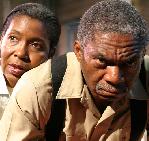SITE GUIDE
REVIEWS
FEATURES
NEWS
Etcetera and
Short Term Listings
LISTINGS
Broadway
Off-Broadway
NYC Restaurants
BOOKS and CDs
OTHER PLACES
Berkshires
London
California
DC
Philadelphia
Elsewhere
QUOTES
On TKTS
PLAYWRIGHTS' ALBUMS
LETTERS TO EDITOR
FILM
LINKS
MISCELLANEOUS
Free Updates
Masthead
Writing for Us
A CurtainUp Los Angeles Review
Fences
|
You ain't never done nothin' but hold me back. Afraid I was
gonna be better than you.
--- Cory to his father Troy |

Elayn J. Taylor and Charlie Robinson in Fences
(Photo: Enci Photography) |
I first saw this play when Wilson labbed it at the Eugene O'Neill Theatre Center's National Playwrights Conference in 1983. It was four hours long. Bill Cobb played Troy and Howard Rollins was an electrifying Gabe. It was streamlined to the present length for the Broadway production with James Earl Jones in the central role. This production is not overshadowed by memories of the initial ones.
In Troy Maxson, Wilson has created one of the towering figures of American drama -- righteous, terrifying, obtuse, monstrous, honorable. He takes three and a half hours to tell the story of Troy and his family, including a monologue where the lights are dimmed almost to darkness as he tells how he came to leave the house of his brutal father. Feeling his daddy in himself, he groans, "I got to the place where I could feel him kicking in my blood and knew that the only thing that separated us was the matter of a few years."
With no skills, the homeless boy became a robber and did 15 years in jail for an inadvertent murder. Now he's putting in the rest of his life as a garbage man, living in the house he bought with his brother Gabriel's disability settlement. A Vietnam vet, Gabe wanders around the streets with a trumpet he plans to play when St. Peter calls him to the pearly gates. Troy's family includes his wife Rose, his teen-age son Cory and visits from his feckless 34-year-old son Lyons by his first wife who shows up every payday to borrow money. His best friend Bono, whom he met in prison and now works with on the rubbage truck, is an indispensable part of his life.
The story begins in 1957. Troy has a pyrrhic victory when he forces the union to let him drive the garbage truck but finds he's lonely without the companionship of his work mates. His life is further complicated by his delighted obsession with a Florida gal, Alberta, and its tragic consequences. He says of his time with her with stubborn wonder, "I can just be a part of myself that I ain't never been." But the deepest love of Troy's life is his passion for baseball and he mourns his inability to play in the big leagues with all the fury of a rejected lover.
Although Rose tries to make him admit he was too old for the major leagues he insists he just wasn't the right color; nor will he listen to Rose when she tells him times have changed and begs him to let their son Cory be recruited for college football. He claims he won't let his son be hurt by sports like he was but Cory's angry cry, "You're afraid I was gonna be better than you" tells a bitter truth rarely heard on the sports-loving American stage. Unlike the fathers who brag about their sons' athleticism, Troy Maxson can't watch Cory surpass him.
Director Jeffrey Hayden never makes the mistake of creating mythic characters. His direction is easy but shrewd, finding the beats in a play that never seems too long. He develops such strokes as characterizing Rose by having everyone wipe their feet on a doormat before entering her house and dimming the lights during dramatic monologues, which has the symbolic, if unnecessary, effect of putting the audience inside the speaker's memory.
Thomas Brown's warm and leafy set is enhanced by Luke Moyer's mellow lighting. The fine cast is anchored by Charlie Robinson as Troy. He finds the humor and roguish charm in this complex man, the playful tenderness in his relationship with Rose, and the jealous obtuseness towards his sons that mars his broken life. Elayn J. Taylor is a warm enchanting Rose, whose discipline is both Troy's staff and one of the fences he longs to leap over. The character of Troy's brother, Gabriel, the wounded Vietnam veteran, evokes the Sacred Fool that has been a dramatic staple from the beginning of theatre. Dig Wayne makes a gentle unforgettable impression that lights up the stage. In Jonathan T. Floyd's performance, we see Lyons as the older son who has inherited Troy's charm. Tjader France makes Cory, the younger son, a handsome and ambitious youth whose conflicts with Troy mirror Troy's own conflicts with his father. William Stanford Davis plays Bono, Troy's confidante. Male bonding is often an essential part of a Wilson play and Bono's desertion is the most painful blow of all.
Wilson's plan was to write a play about the lives of African-Americans in each decade of his 20th century but, although the people in Fences live those lives, they also transcend them. The jealousies and needs that drive them are universal and the humor and playfulness make them as familiar to all of us as sun on moving waters.
|
FENCES Playwright: August Wilson Director: Jeffrey Hayden Cast: Charlie Robinson (Troy). Elayn J. Taylor (Rose), William Stanford Davis (Bono), Jonathan T. Floyd (Lyons), Dig Wayne (Gabriel), Tjader France (Cory), Wynter Daggs (Raynell) Set Design: Thomas Brown Lighting Design: Luke Moyer Costume Design: James Bobby Original Music and Sound Design: Peter A. Romano Running Time: Three and a half hours, one intermission Running Dates: June 10-August 6, 2006 Where: The Odyssey Theatre, 2055 S. Sepulveda Blvd., Los Angeles, Reservations: (310) 477-2055 Reviewed by Laura Hitchcock on June 25. |
The Internet Theatre Bookshop "Virtually Every Play in the World" --even out of print plays

